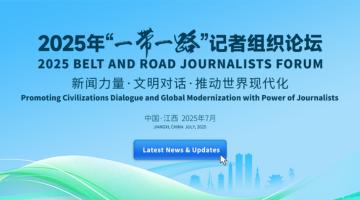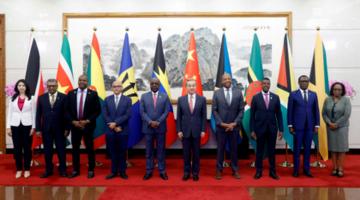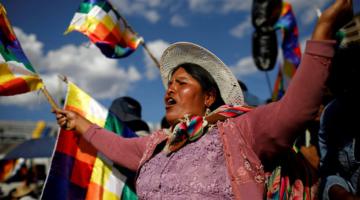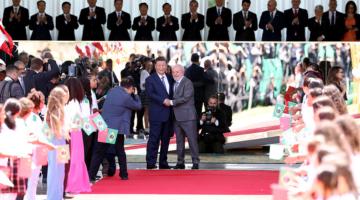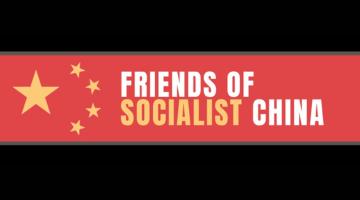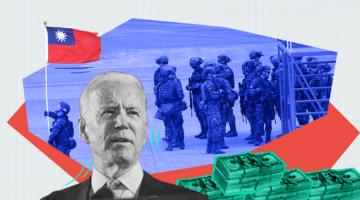Wang Yi, China's top diplomat, with Secretary of Iran's Supreme National Security Council Ali Shamkhani and national security adviser of Saudi Arabia Musaad bin Mohammed Al Aiban in Beijing on March 10, 2023. (Photo: China Daily/Reuters)
As the U.S. makes threats and wages proxy wars, China is the new leader in international diplomacy.
This article was originally published in CGTN.
On the one-year anniversary of the Russia-Ukraine conflict, China released a position paper on the path forward to peace. U.S. Secretary of State Antony Blinken claimed that the peace proposal lacked credibility and questioned China's commitment to the sovereignty and international law. Just weeks after China released its position on peace in Ukraine, Blinken was proven wrong. Saudi Arabia and Iran agreed to reestablish relations on March 10 after a round of successful talks that took place in Beijing.
Wang Yi, director of the Office of the Foreign Affairs Commission of the Communist Party of China (CPC) Central Committee, called the agreement a victory for peace. He was right. That two nations with complex differences and disputes were willing to sit down with their Chinese counterparts to work toward peace in a region that's been devastated by war and external interference is indeed a major victory.
The reestablishment of ties between Iran and Saudi Arabia opens several possible doors to resolve pressing issues such as the status of Palestine, the war in Yemen, and Saudi Arabia and Iran's future participation in multilateral institutions such as the BRICS Plus and Shanghai Cooperation Organization (SCO). Both Iran and Saudi Arabia agreed to respect the sovereignty and internal affairs of other nations, a key pillar of peaceful development.
Contrary to the U.S. narrative, China's leadership has injected confidence into a world of uncertainty and strife. In the field of global politics, China has demonstrated through concerted action just how serious it is about the cause of peace. The landmark diplomatic achievement between Saudi Arabia and Iran does not exist in a vacuum. It is part of China's overall leadership role in the larger global movement to democratize international relations and move away from destructive hegemonism.
In this regard, China has both talked the talk and walked the walk. China has remained neutral and handled the world-altering Ukraine crisis in a manner consistent with international law. Rather than following the U.S. and the West in throwing fuel onto a fire with weapons sales and sanctions, China maintained relations with all sides and made itself available as a possible mediator for peace. This is consistent with China's longstanding policy of non-interference in the affairs of other countries. The world has been watching carefully as China has stood tall in opposing illegal and counterproductive Western-led sanctions, color revolutions, and aggressive militarism.
Perhaps even more impressive is the fact that China helped mediate the successful talks between Iran and Saudi Arabia during the nation's annual Two Sessions. Thousands of deputies and representatives have been deliberating around the clock to review achievements and set the policy agenda for the coming year. Despite a global economic slowdown, China's GDP grew by 3 percent in 2022 and an around 5 percent GDP growth rate target has been set for 2023. The Consumer Price Index (CPI) for Chinese goods and services fell to just 1 percent in February, a signal that China has successfully defeated inflationary pressures currently wracking the West.
China's rise has accelerated by leaps and bounds, paving the way to a more prosperous and stable livelihood for the Chinese people and an example of global leadership that both Chinese people and the people of the world can be proud of.
The success of the Iran-Saudi talks in Beijing alone should put naysayers of China's global "credibility" to rest. However, China's leadership has long been embraced the majority of the world's nations. This is most clearly reflected in the massive interest in China's Belt and Road Initiative (BRI) which currently is comprised of over 140 countries and several thousand infrastructure projects either completed or under development.
China's staunch opposition to economic sanctions and zero-sum relations has given nations in all corners of the world confidence in its global leadership. The U.S. and West make up a minority of global public opinion despite their leaders' insistence that they alone speak for the "international community."
Lies can poison the psyche, but they can't change reality. Facts are stubborn things. The fact is that China's leadership has injected hope into a world in dire need of it. China's facilitation of successful talks between Iran and Saudi Arabia is concrete proof.
Danny Haiphong is a contributor to Black Agenda Report and host of The Left Lens. You can support Danny on Patreon by clicking this link. You can contact him at haiphongpress@protonmail.com.


